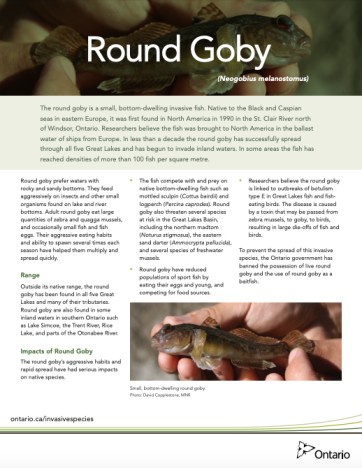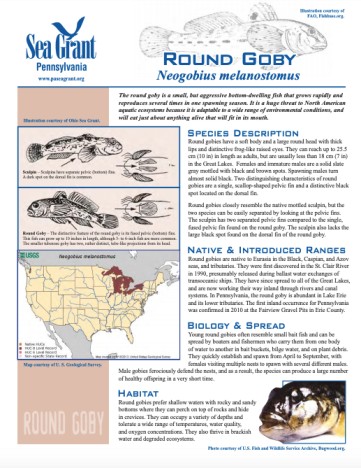Round Goby (Neogobius melanostomus)
French common name: Gobie à taches noires
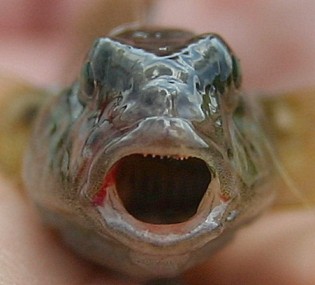
It is illegal to possess live round goby or use them as bait in Canada. Never transport fish from lake to lake and make sure to always wash your equipment after being in the water.
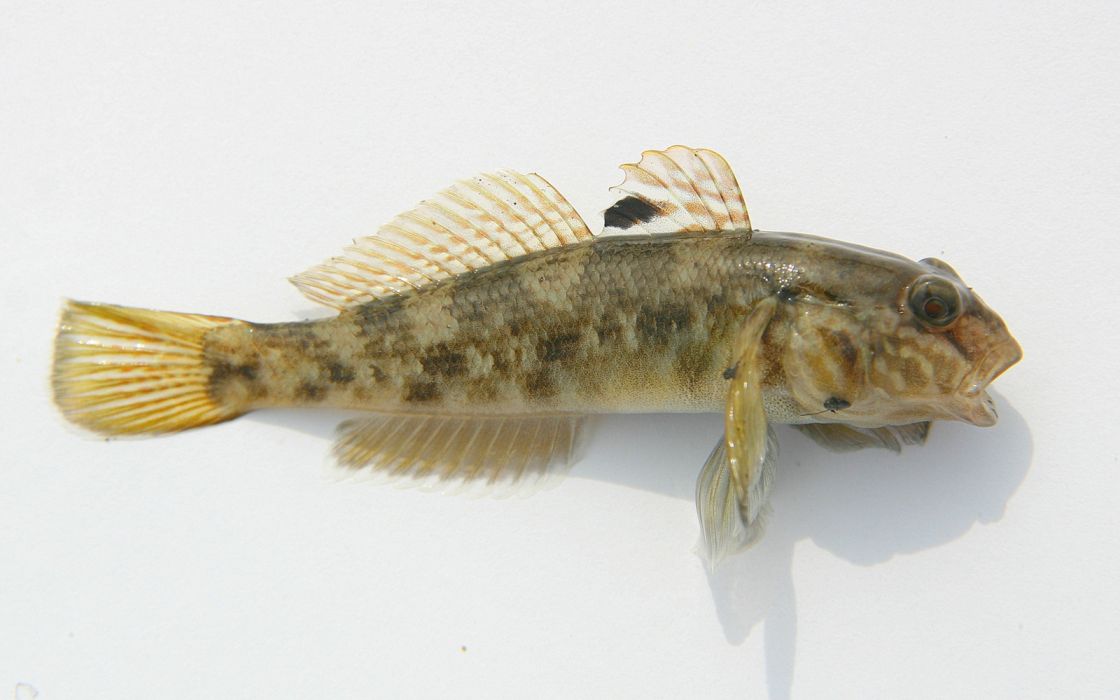
The round goby is fully scaled and mostly brown or olive with dark brown and black spots.
Order: Gobiiformes
Family: Gobiidae
The round goby is a small, bottom dwelling fish that aggressively feeds on small aquatic organisms and can spawn several times each year. Adult round goby can be between 6-16 cm long with a cylindrical body and rounded snout. They are fully scaled and mostly brown or olive with dark brown and black spots. Round goby decrease the levels of native fish by eating eggs and competing for food. It is also suggested that round goby pass a strain of botulism to the birds and fish that eat them; this toxin comes from the zebra mussels that the goby eat and causes fish and bird death. It is illegal in Canada to possess live round goby or use them as bait. Never transport fish from lake to lake and make sure to always wash your equipment after being in the water.
Adult round goby are 6-16 cm long with a cylindrical body and a rounded to blunt snout.
Young round gobies are solid slate grey. Older fish are blotched with black and brown and have a white to greenish dorsal fin with a black spot at the posterior base. This goby is superficially similar to native sculpins but can be distinguished by the presence of fused pelvic fins (sculpins have two separate fins; Marsden and Jude 1995; Hubbs et al. 2004).
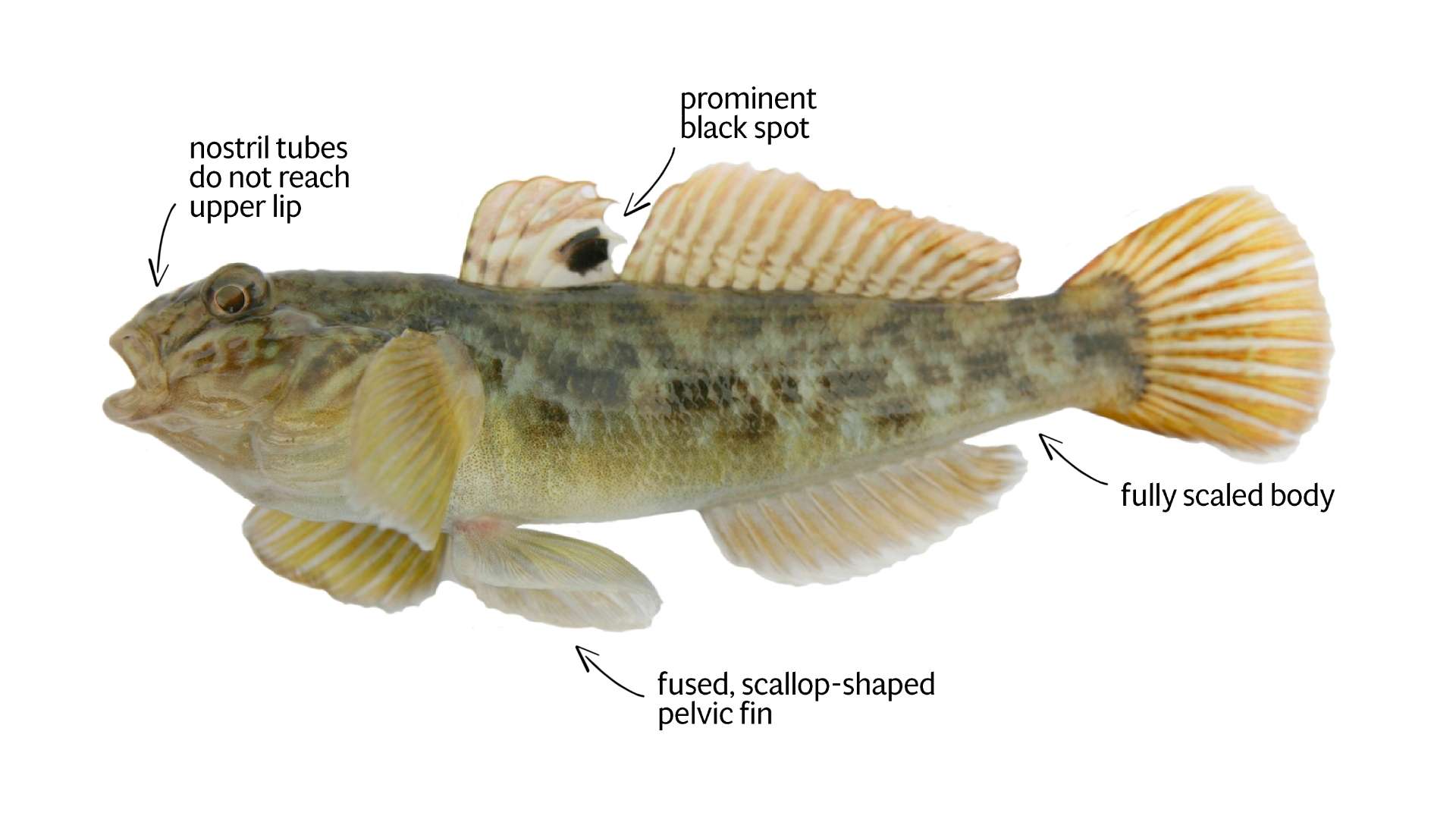
Outside its native range, the round goby has been found in all five Great Lakes. Round goby is also found in some inland waters in southern Ontario including Lake Simcoe, the Trent River, Rice Lake, and parts of the Otonabee River.
Round goby was considered extremely abundant in the St. Clair River in 1994.
The numbers of native fish species have declined in areas where the round goby has become abundant (Crossman et al. 1992). This species has been found to prey on darters, other small fish, and lake trout eggs. They have also been found to have a significant overlap in diet preference with many native fish species.
The diet of larger round gobies consists mainly of zebra mussels, which no other fish species of the Great Lakes consumes so heavily, allowing round gobies to uniquely exploit a resource that could fuel a population explosion (Vanderploeg et al. 2002). Walleye anglers in Detroit report that at times, all they can catch are gobies, which eagerly attack bait (Marsden and Jude 1995).
The invasion of round goby into Lake Erie has had very real environmental and economic impacts. Beginning in 2004, the State of Ohio has closed the smallmouth bass fishery in Lake Erie during the months of May and June due to high predation rates by gobies on nests, affecting recruitment. Under normal circumstances, male smallmouth bass guard nests and are effective in deterring gobies. When males are removed, gobies immediately invade and have been shown to eat up to 4,000 eggs within 15 minutes. The months of May and June normally account for 50% of the total smallmouth bass catch in Lake Erie so there will be a considerable loss in funds generated by recreational fishers (National Invasive Species Council 2004).
The round goby’s aggressive habits and rapid spread have had serious impacts on native species in Ontario (Ontario factsheet).
- The fish compete with and prey on native bottom-dwelling fish such as mottled sculpin (Cottus bairdii) and logperch (Percina caprodes). Round goby also threaten several species at risk in the Great Lakes Basin, including the northern madtom (Noturus stigmosus), the eastern sand darter (Ammocrypta pellucida), and several species of freshwater mussels.
- Round goby have reduced populations of sport fish by eating their eggs and young and competing for food sources.
- Researchers believe the round goby is linked to outbreaks of botulism type E in Great Lakes fish and fisheating birds. The disease is caused by a toxin that may be passed from zebra mussels, to goby, to birds, resulting in large die-offs of fish and birds.
Fact Sheets
Best Management Practices

Lorem ipsum dolor sit amet, consectetur adipiscing elit. Ut elit tellus, luctus nec ullamcorper mattis, pulvinar dapibus leo.
Articles
The Round Goby, Neogobius melanostomus, a Fish Invader on both sides of the Atlantic Ocean
goby (Gobiidae: Neogobius melanostomus), has spread from its native region in the Ponto-
Caspian throughout Europe and to the Laurentian Great Lakes in North America. An …
A potential new energy pathway in central Lake Erie: the round goby connection
contaminant, and nutrient pathways. Our objective was to quantify how they alter energy
pathways in the central basin of Lake Erie by describing their diet and identifying the degree …
Monitoring round goby (Neogobius melanostomus) population expansion in eastern and northern Lake Michigan
reported from the St. Clair River in 1990. Reported here are the details of range extension
and establishment of round gobies in eastern Lake Michigan at Grand Haven, Michigan and …
Current Research and Knowledge Gaps
Lorem ipsum dolor sit amet, consectetur adipiscing elit. Ut elit tellus, luctus nec ullamcorper mattis, pulvinar dapibus leo.
Further Reading
The Invasive Species Centre aims to connect stakeholders. The following information below link to resources that have been created by external organizations.

